On Tuesday night, before the realtor's visit, flashes of light appeared in my vision; having learned from our friend Vendula about symptoms of detached retina, I concluded I was apparently turning blind. Within next hour I discovered that I would probably keep my sight, for the flashes were indeed lightning from an approaching thunderstorm. This would be rather funny, if the lightning did not ignite numerous wildfires in Santa Cruz Mountains. And so, during our Wednesday meeting with the realtor, I was very antsy; I expected any moment an alarm to evacuate goat stables. Toni and Trudy reached an opinion that it would not be as hasty, and that we could wait some more — still I had my phone on all night, just in case we needed to drive out.
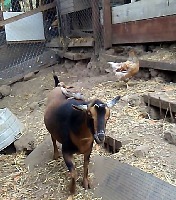 |
| Comedian Brownie lets chickens ride on his back around the pen. |
On Friday the wildfires got closer and I made the decision to take the goats altogether out of the area, away from smoke and stress. We had originally planned to take Twilight, Licky, Pluto and Rocket (Casper belongs to Trudy). But the plan also counted on our having two buses, thus being able to load four goats. Trudy came with the idea to keep the twins as well, so that Casper would not remain a lonely baby goat. Eventually that proved to be a decent solution — Trudy can load three babies on her truck, and in the case of an evacuation of her property, she'd be able to move all three boys. She could not load five, though. We were able to move only two goats — the mothers — for whom we arranged a resort stay at Colleen's on the eastern side of the Sierra.
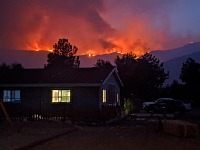 |
| Even at Colleen's, the goats did not escape wildfires on the horizon (photo Colleen). |
We reached Colleen's place by midnight, room, hay and water for our goats were set ready in her barn. Colleen herself was at the pack station, so we just unloaded the goats — again, Twilight and Licorice seemed quite alright — they already knew local goats and the barn, and across the ranch, buck Jasper called them — at least there was no drama on this side. We set our beds in the car right next to the barn, and after checking the goats quickly in the morning, we kept driving on to the east.
Having a sale contract for our house "in our pocket", it suddenly made much more sense to go look at potential new homes. For a few days already we emailed back and forth with a realtor in Cheyenne, the capitol of Wyoming. The contract has flipped us from the category of random visitors to the class of serious clients. We had also gained an idea how much money we would have available — how much would remain after paying off remaining mortgage, and how much would be eaten by various costs, fees and taxes. Our buyer was paying cash — we did not have to wait for a bank to check out and appraise the house and consider extending a loan. Thus, we, too, could make a cash offer — market differences (houses in Cheyenne are about four times cheaper than in the Bay Area) meant we did not have to take a loan, unless we wished to buy a ranch across much of the county.
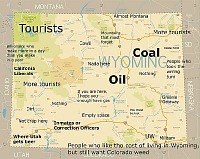 |
| A helpful map for those not familiar with Wyoming. |
So we found ourselves heading unerringly east from Colleen. It's all very simple — interstate number eighty goes from San Francisco to New York (via Chicago, but also Salt Lake City and Cheyenne) — thus matching my idea about navigation in America... you keep going straight for three days, and then turn right. So we went and went, over Saturday we reached the eastern edge of Utah and town of Coalville. We engage a local front desk clerk into talking about (her) life there and so; the small town had impressed us, being set in a beautiful landscape with a river and rocks. The clerk was very cautious, but eventually admitted that growing up as a teenager in a place where you're one of the very few who are not members of the Mormon Church, is rather hard. Which we had expected, but it was well to confirm our assumption.
On Sunday we only needed to cross the whole Wyoming, and so we could devote part of our afternoon to exploring possible areas to live. West of Cheyenne lies a small hamlet of Granite, with a few houses for sale, and since according to Google it is found on a high plateau with rocks and trees, it seemed suitable for checking out. Alas, as soon as we turned the first corner, it became clear the appearance was deceitful. No Zillow or Google picture would ever show the monstrous windmills. I mean the wind farm propellers with each blade at least hundred feet long, which you can see (and hear) wide and far. Deterred, we continued through Cheyenne to its eastern end, where we booked a hotel — and a bit farther had looked up another house. We found it, and Sid eagerly spotted a utility box in the ground next to a driveway, to declare the place was indeed on an optical cable for internet.
Then we drove around few more candidates from the real-estate agencies' list, to get the feel for the landscape and neighborhoods, to listen how much one can hear the interstate, and appraise how long is the dirt section of the access road — even in "the city" paved roads are rather in minority here — in areas without businesses and outlets, where consequently only residents drive, pavement is rare. This has made us a bit nervous, for at six thousand feet altitude one can expect snow, and traveling miles and miles in mud is, let's say, suboptimal. Our realtor directed us then to the area called The Ranchettes — these turned out four-acre lots with ranch-style houses, in a very nice location — for her colleague told her that he would have a house for sale there beginning Monday.
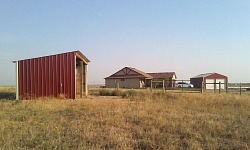 |
| Sid checked out internet connection cables, while my priority was placement for my goaties. |
Then we visited a house, which we had liked very much even just online — until we realized that the heating furnace and air-conditioning was installed right next to the master bedroom, above another basement bedroom, and there would be no running away from all the racket, be summer or winter. This meant the house would need serious structural changes. Yet it was located in a nice neighborhood, with grown trees and a beautiful barn, with a corral for animals. On the next property, there even were goats present — beautiful pygmies, who scrutinized us cautiously — but the house itself was a manufactured one, furnished in the fifties — somewhat smaller than our previous home. We had to turn it down as well. Sid's favorite with awesome internet connection remained. There, a difference to the others was immediately noticeable — instead of pondering what all would need to change, we suddenly wondered how we could use all that it offered.
 |
| One of arguments for choosing Cheyenne is this excellent train station brewery. |
In Cheyenne we had run into yet another model, a concept of Covenants. On first glance it looks very much like the California HOA system, which scared us a lot. HOAs mostly remind us of our old-country Street Committees, where a murder of Karens (if you're lost, see crows, flock of) had the final word about everything while none of their business. And they charge fees for the privilege and draw salary. In Cheyenne, this system evolved a bit differently — instead of zoning, development permits establish similar rules — and the rules automatically transfer onto future owners of individual lots. In their very nature, these rules are familiar. One may not dig for fossil fuels on the lot, create a dump or a race-track; establishing a pig-farm or a warehouse is not allowed, and so on. The difference to California is in the absence of a "paid committee", it remains a neighborhood agreement. And when we finished reading through the rules and restrictions, we realized that they made sense and that we like them. Indeed, we would not want our neighbor to set up an oil derrick on his property, or a pig farm. And we are willing to abide by the same.
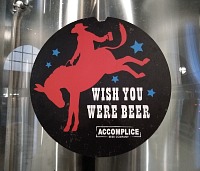 |
| Many a Czech would appreciate local beer. |
We learned in the afternoon that our offer got accepted, so we quickly made an "earnest" deposit — and went to sleep before our long journey back home. Even while taking turns behind the wheel, it took us two days to cover the twelve hundred miles distance. All the while, a completely surreal feeling kept creeping around our minds — within seven days we accomplished to sell our house, find and sign a contract on a new one — and also evacuate our goats and drive several thousands of miles. It kept seeming like some crazy dream.




